|
By Thomas Day
The young Russian woman, pausing from her work in the hot Illinois sun, said, "For there to be peace in the world, we must know each other. "If you don't believe there can be peace, there is no sense in living." Lina Ivanovna Shkarban, 27, a -postgraduate linguistics student at Moscow University, stood gear a stack of p i n e beams at Camp Reinberg, a privately financed camp northwest of Palatine. She and 27 other Russians, Americans and Britons had traveled thousands of miles to build a new wing for the camp dining hall. Ten Americans; 10 Britons and 8 Russians are participating. The work at the camp is called officially the Tripartite Work and Study Project. The project is sponsored by the American Friends Service Committee, the Friends Service Council of Great Britain and the Committee of Youth Organizations, a government agency in the Soviet Union. To the children at Camp Reinberg, aged 8 through 12, it may seem that the new wing, 40 by 31 feet, is the purpose of the work. It will accommodate 90 campers, with heating installed for the winter months. But a Chicago member of the visiting group, Rozell W. Nesbitt, 20, said the construction was a means. |
"It is sometimes easier to
communicate
through blisters than words," he explained. "It breaks
down the reserve." The 28 "crude laborers" as one described them - will live for three weeks at the camp, established so that children from Chicago could leave the city streets for the forest preserve land off Quentin Rd. Half the group will spend a fourth week in California, the other half in North Carolina. Both states have Friends youth projects. For several hours a day, the 28 help level the ground for the cement floor, raise the structure of the hall and do odd jobs on other camp buildings. Gradually the wing takes shape. But the talk of the workers shifts quickly from the camp.
"But you have tremendous problems too," she said in what she called her Moscow English and mentioned civil rights. Nesbitt, who lives at 1514 S. Albany and is a member of the National Assn. for the Advancement of Colored People and the Congress of Racial Equality, |
confirmed the interest
of both Britons and Russians in the
question of civil rights.
He has helped arrange a meeting
with local leaders "along the whole
spectrum' of rights groups."
Paster, heed of the Education Abroad Program at Antioch College, says of the Russian reaction to their American experience, "They don't buy our way of doing things, but they are beginning to understand it." The group has visited homes in Barrington, and on the West Side, near a Friends project house at 3543 W. Jackson. Few are surprised at the disparity.
"It's natural," said one Muscovite. At the camp now are children from Marcy Center, Hyde Park Neighborhood Club, |

| |
|---|---|
| Gads Hill Center, Association House of Chicago, American Indian Center and Randall House. The camp's $121,000 annual operating budget, said Mrs.George D. Smitt II, a vice president of the camp board, is borne about equally by the Community Fund, fees from groups using the camp and board contributions. | Whether the 28 can help "break down the wall of distrust and fear" that separates East and West, as one of them hoped, is not really the question, Paster said. "They can at least learn to talk to one another," he said. And all the 28 are either college students or graduates "who will attain positions of influence in the professions and in business." He added: "They are becoming more cosmopolitan." |